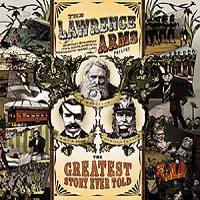You can dissect the inclusion and intertwining of the various literary and pop-culture references scattered throughout The Greatest Story Ever Told all you want, and you can even translate the footnotes of the direct inspirations to craft your own interpretations, but would all of that really make a difference in how you feel about the songs - or the record as a whole?
The balance between literal imagery and clever metaphors has been a constant over their twenty-plus year run, but The Lawrence Arms have always spoken to me more so in the delivery of their words, than the words they’ve delivered. It’s the emotional trip of feeling like Chris McCaughan is singing to you, where Brendan Kelly is singing for you, (as Neil Hennessy laughs at you from afar for such a cringey statement.) The lyrical content is spewed across smooth eloquence and gravelly rage, where the vocal expressions themselves can enhance any moment, or even give meaning to any personal situation. They write for the scholar, but the end-product is mostly consumed with the open-mindedness and cultural ignorance of a simpleton.
Released in 2003, The Lawrence Arms approached their fourth full-length as a concept, taking on personas and creatively melding together sitcoms, juggalos, a satirical novel from the Stalin-era Soviet Union and more, into a singular, circus-themed story. Seventeen years later, I still don’t think I can provide a true synopsis of said story, only that The Greatest Story Ever Told can be summarized as a record full of smooth and sobering singles not dependent on the holistic vision of the record. Each stands out individually; each with specific moments that spark spontaneous emotional reactions.
Front to back, Chris and Brendan, err, “Ivan Nikolayevich and Ferdinand Magellan,” go one-for-one sequentially taking lead on vocals, teetering between heart-throbbing softness and blood-pumping anti-hero rowdiness. The eerie intro makes way for the beautifully morbid “Raw and Searing Flesh” that exhumes the hair-raising “These flames have never burned so high / I won't be staring in your eyes.” The track winds down and Brendan breaks through with the fan-favorite charge of “On With the Show” that’s only elevated with its driving bridge of “I'm a clown, I'm just here to entertain / Tear me up and stuff me down the drain.” “Drunk Mouth Kitchen Smile” showcases Brendan’s sandpapery gruff complementing Chris’s polished arrangements, building up to the passionate presentment of lines like "Autumn night / Stay soft and cool / Come morning light / I'll be gooone.”
Listening through, the arc of the record, or highlight of highlights, comes with the quick and crushing “March of the Elephants.” It’s instantaneously reactionary, pulsating and energetic that’s powered by Neil’s, err, “Gordon Shumway’s” gracefully erratic skills behind the kit. Where it hits the hardest though, where it evokes pure force, is coming out of the second verse into the hook with, “But it's the same exact shit that the dirt and sea haaaate / I am an animal, unprepared.”
It’s the intricate parts and the minor details that make this story so great. I can pick and pull apart these subtle instances where brilliant wordsmithing and thoughtful lyricism take a backseat to how they are actually brought to life, like:
“Take a chill pill, lover, or you're gonna explode / Take two of these too and you'll find that I knowwwww” from the skate-punkish “Hesitation Station,” and the gut-tugging, tempo-shifting of “The time is never ripe /The words are never right” from “The Revisionist.”
The Greatest Story Ever Told is The Lawrence Arms’ most complete and consistent record to date. Not because of the single-minded objective or direction, but because every track, whether it’s simultaneously depressing and endearing like “Wishful Puppeteer,” or filthy and cautiously inviting like “The Ramblin’ Boys of Pleasure,” manages to hold up on its own and in the context of album’s concept. There are no holes, and no transitional filler that you'd expect when writing a “story.” The intentions were to make you think and to analyze the randomness of the references included, but instead, the songs came to you first, stimulating and unlocking thoughts related stories of your own.
